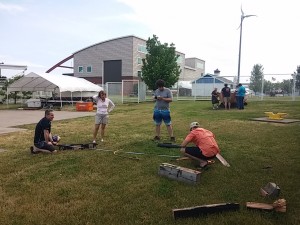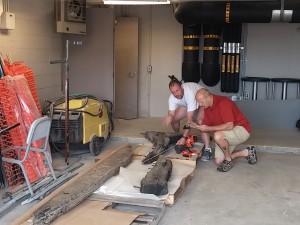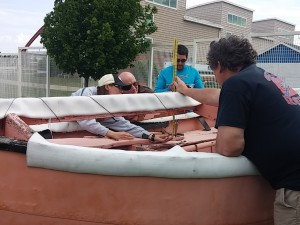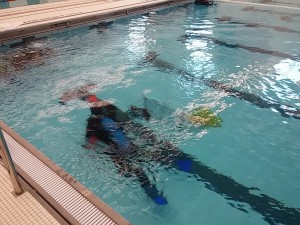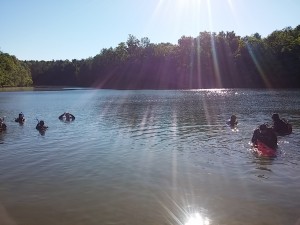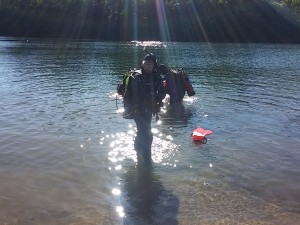IUP is pretty well landlocked, but that doesn’t mean that we can’t take our archaeology underwater. Last weekend I taught an underwater archaeological wreck survey course at Erie, PA. The course was organized through the Pennsylvania Archaeology Shipwreck Survey Team (PASST) and sponsored by the Regional Science Consortium, Pennsylvania Sea Grant, Divers World dive shop, and Erie Maritime Museum.
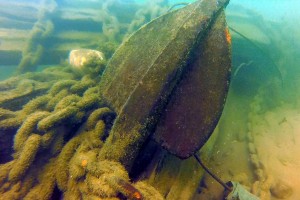 Shipwreck off of Presque Isle, Erie, PA (Courtesy of PASST)
Shipwreck off of Presque Isle, Erie, PA (Courtesy of PASST)
From Friday night through Sunday afternoon, 15 students learned the basics of underwater archaeological recording. We started Friday evening with a lecture on maritime archaeology, archaeological ethics, and how to accurately record an archaeological site underwater (lots of trilateration!). Saturday morning we met at the Erie Maritime Museum to practice these skills using items from their collections. Teams of four recorded a lifeboat, the deadwood of a large vessel, and two mock debris fields. In the afternoon we took these skills to the pool. Working with the same teams, the class recorded PVC structures, ladders, and other items on the pool bottom. The materials were not archaeological but the skills were. Everyone learned that pulling a tape and communicating locations and measurements got a lot harder without gravity and the ability to speak. On Sunday morning we travelled to Dinardo’s in Grove City to take the training to the real world. This time the teams did two dives to record two intentionally sunk vessels and a motorcycle while dealing with limited visibility, a silty bottom, and the bulky suits and gloves that come with diving in chilly water. Everyone did an excellent job throughout the weekend! The importance of preplanning and communication became increasingly apparent as did the slow and meticulous nature of archaeology – dreams of recording a shipwreck in one dive disappeared like bubbles from a regulator. Everyone also gained an appreciation for what can be learned by studying a shipwreck and it caused them to think more carefully about sites that they have dived dozens of times.
Practicing at the Erie Maritime Museum and in the pool. Nice plumb bob work in the bottom left image.
Having completed the course all of the participants now have the privilege of diving on PASST projects. PASST was founded in 2013 by representatives of the Regional Science Consortium, Flagship Niagara League, Indiana University of PA, PA DCNR, PA DEP, PA Historical Museum Commission, PA Sea Grant, S.O.N.S. of Lake Erie, and the local diving community with the goal of preserving and promoting the maritime heritage of Pennsylvania’s portion of Lake Erie. Drawing on educators, historians, divers, and archaeologists PASST is dedicated to the documentation, scientific study, and educational promotion of Pennsylvania’s underwater archeological resources. As part of this mission, PASST organizes divers to document shipwrecks in Lake Erie. PASST-trained divers have the skills ethical orientation to participate in those efforts.
Divers entering Dinardo’s Quarry for the open water portion of the course. The water was a balmy 65 degrees above the thermocline.
These dives will be happening throughout the summer, and next, and the one after that… there are a lot of shipwrecks to record. Another underwater archaeological wreck survey course is planned for next summer. This is not strictly an IUP course, but it is open to IUP students who have an Advanced diving certification and an interest in archaeology. The class is also a way fo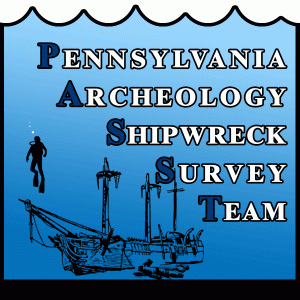 r us to engage the general public in recording and preserving the history of the Commonwealth.
r us to engage the general public in recording and preserving the history of the Commonwealth.
Thanks to Matt Dickey, Jeanette Schnars, David Boughton, and Joe Lengieza for making the class a success.
